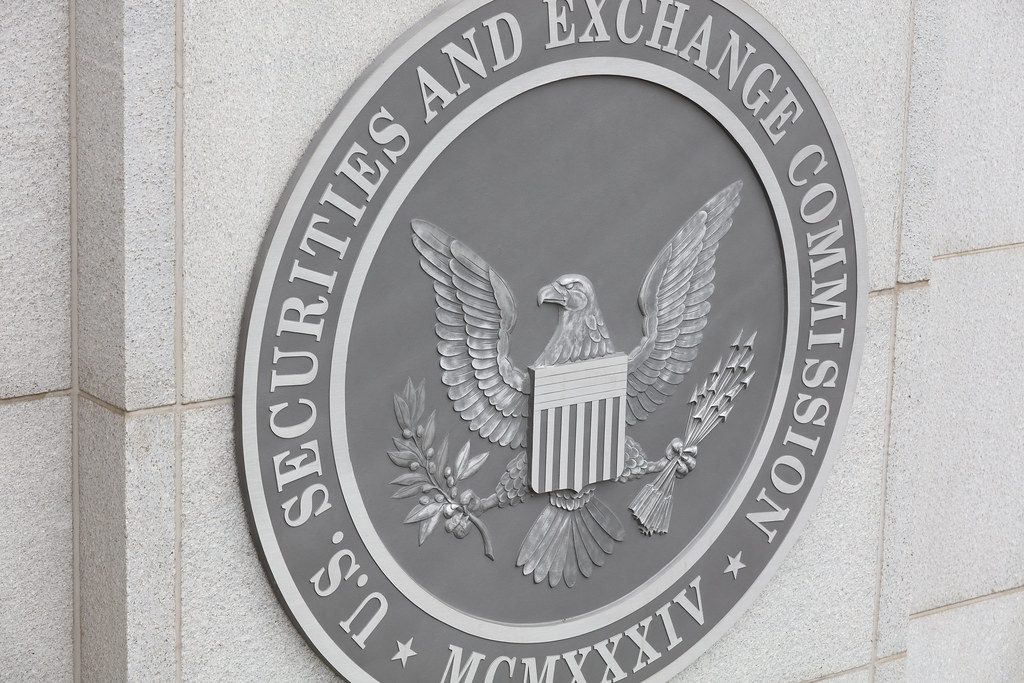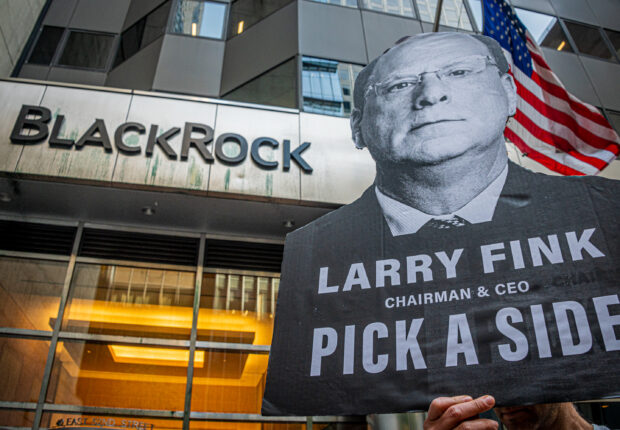We applaud BlackRock’s call for private companies to be required to disclose climate risk and approve of its agreement with the broad outlines of the SEC’s initiative. However, the asset manager’s proposed amendments would allow BlackRock and other Wall Street titans to continue concealing the enormous risks posed by their continued financing of fossil fuel industry expansion.

Last week, BlackRock filed comments with the SEC calling for a dramatic weakening of the SEC’s proposal to mandate climate risk disclosure by public companies. The asset manager’s leadership repeatedly insists that BlackRock views climate risk as investment risk, yet the proposed amendments to the SEC rule create gaping loopholes that damage the scope and caliber of the disclosure of that risk.
Visibility into a company’s whole emissions footprint is crucial to a real assessment of the company’s climate risk. Advocating for voluntary and incomplete disclosures only helps companies hide that risk and harms its investors — including BlackRock’s own clients and shareholders.
The most damaging recommendations by BlackRock fall into three categories: scope 3 emissions, liability, and materiality. Our in-depth analysis of the asset manager’s comments is below.
Scope 3 Disclosures Would Become Largely Voluntary
BlackRock calls for a near-elimination of the duty to disclose Scope 3 (value chain) emissions, despite acknowledging that they are a key metric used by investors in evaluating a registrant’s climate-related financial risk. Investors evaluating BlackRock’s climate risk especially need disclosure of its Scope 3 emissions (also called “financed emissions”) — they represent the vast majority of its total GHG emissions. In fact, BlackRock’s status as the world’s largest asset manager and its heavy financing of fossil fuel expansion means that it is exposed to high transition risk.
In its comments, BlackRock fails to discuss the fact that if its recommendations for weakening the SEC’s Scope 3 disclosure proposal were adopted, its ability to conceal its transition risk from its investors would be greatly enhanced. In fact, BlackRock downplays the fact that it is a registrant with disclosure duties toward its investor-clients and shareholders, instead assuming the mantle of an “investor” primarily interested in disclosure. (BlackRock states in its comment that “As investors, we use Scope 3 emissions as a proxy metric (among others) for the degree of exposure companies have to carbon-intensive business models and technologies.”)
In its proposal, the SEC called for Scope 3 emissions to be disclosed whenever a registrant has a Scope 3 target or, in cases where there is no such target, whenever a registrant determines for itself that such emissions would be material to investors.
One of BlackRock’s Big Problem anchor organizations, the Sierra Club, and many others called for the SEC to strengthen this Scope 3 disclosure requirement. Specifically, the organization recommended eliminating the “self-declared non-materiality” loophole and to require Scope 3 disclosures for all registrants. Allowing registrants to decide materiality for themselves was tried by the SEC in its 2010 climate risk guidance and it is universally accepted that this experiment failed to produce needed climate risk information.
In its comments, with virtually no explanation, BlackRock recommends eliminating the proposed “disclose Scope 3 emissions if you have a Scope 3 target” requirement. This would be a dramatic weakening of the SEC proposal, considering that roughly 3,000 companies have committed to setting SBTi emissions targets, and SBTI requires Scope 3 targets for most companies. (SBTi requires such disclosures if they amount to 40% or more of total emissions and, for many companies, the majority of emissions are Scope 3).
BlackRock further proposes to allow all registrants to evade Scope 3 disclosure so long as they offer an explanation: either the information is not relevant to the issuer or it is not subject to reasonable estimation. This is a recipe for failure — many registrants have shown that they are motivated not to disclose Scope 3 and are quite willing to take advantage of available loopholes.
BlackRock’s primary explanation for this proposed weakening of Scope 3 requirements is that “we do not believe the purpose of Scope 3 disclosure requirements should be to push publicly traded companies into the role of enforcing emission reduction targets outside of their control.” This is an outrageous mischaracterization of the SEC’s purpose, which is stated very clearly in the proposal as protecting investors and capital markets, not forcing emissions reductions. It is shocking to see a major publicly-traded company seeking to brand itself as a climate change leader using the inaccurate and inflammatory talking points typically employed by anti-regulatory advocacy groups.
BlackRock’s secondary explanation is that more time is needed for data to become more available and reliable and for methodologies to be established. This is an argument for requiring Scope 3 disclosures, not making them voluntary. Improving data availability and reliability and estimation methodologies can only be achieved if companies are oriented toward compliance with a Scope 3 mandate rather than crafting legally-sanctioned explanations for non-disclosure, which would greatly inhibit the Commission’s and shareholders’ ability to deter fraud and file anti-fraud enforcement actions.
Registrants Would be Insulated from Liability for Fraudulent Disclosures and Omissions
Throughout its comments, BlackRock urges the SEC to adopt measures that would insulate it and other registrants from liability for fraudulent disclosures and omissions. For example, BlackRock calls for expanding the SEC’s proposed safe harbor, which would insulate registrants from liability for inaccurate Scope 3 disclosures unless made or reaffirmed “without a reasonable basis” or disclosed “other than in good faith.” According to BlackRock, this liability protection should extend to Scope 1 and 2 disclosures as well.
Perhaps even more significantly, BlackRock proposes that a significant portion of the required disclosures be “furnished” rather than “filed” as proposed by the SEC. This is a major blow. As the Sierra Club and others demonstrated in their comments, the SEC’s proposal to require filing of climate information is critical to ensure that such information is reliable.
Ignoring this essential safeguard against fraud, BlackRock argues that the SEC should only require filings for disclosures about matters such as climate targets, transition plans, governance and risk management (which it calls “Analytical and Planning Measures”) if registrants self-determine that such matters are material. As with non-disclosures of Scope 3 emissions, registrants would be required to explain their non-disclosures of these “Analytical and Planning Measures.” BlackRock urges the SEC to apply the materiality standard in TSC Industries,Inc.v.Northway,Inc.” The asset manager fails to acknowledge that this standard has never been used in rulemakings and that the SEC has broad authority to require filings even when not individually determined to be material.
Registrants Would be Allowed to Withhold Critical Financial Information from Disclosure
In its proposed new Article 14 of Regulation S-X, the SEC would require that registrants disclose the financial impacts of climate risks if the absolute value of the total impact is one percent or more of the total line item for the relevant fiscal year. In addition, following the approach of the TCFD, it would require disaggregating climate-related metrics by geographic area and business unit. The SEC correctly recognized that a quantitative threshold and disaggregated metrics would help generate consistent, comparable disclosure, both over time and across registrants.
BlackRock calls for abandoning these requirements and for the SEC instead to continue following the existing approach of allowing registrants to make a self-determination of materiality. As noted above, the SEC has before it extensive documentation of the failure of this approach. Instead of offering suggestions to modify the financial reporting requirements as other commenters did, BlackRock asks the SEC to scrap all climate-related financial statement reporting requirements in the proposal. While we respect that BlackRock may disagree with the proposed granularity of the financial statement reporting requirement in the current proposal, we do not believe that is grounds to argue that no financial statement reporting should be required. This is an extreme and unexpected position coming from BlackRock, an entity that has repeatedly stated that climate change poses real financial risks to individual companies.
Overall, BlackRock’s position on this rule is disappointing. Disclosure requirements are one of the most immediate and least-intensive ways that regulators can begin to correct the market inefficiencies posed by climate change. BlackRock has publicly called for stronger regulation and government intervention over and over again. Disclosure is just the first step in an urgent and necessary regulatory framework to address climate risk. How can we expect BlackRock to support the more ambitious regulations and market interventions needed to actually reach a net zero economy? If this comment is any indication of the seriousness and sincerity of their stated commitments to stewarding a just and equitable market transition, we are left with serious concerns.

